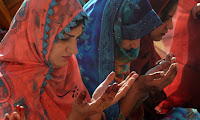THE GUARDIAN: Wealthy, educated women are increasingly embracing the trend for religious inquiry and observance
All the women working in the information technology division of the Bank of Punjab's headquarters in the western Pakistani city of Lahore wear headscarves tightly wound around their cheeks and chin, framing their faces as they tap at their keyboards. A year or so ago not one covered their heads with the hijab.
"I was the first," says 28-year-old Shumaila, as she waited with some impatience in the city's iStore for her new £800 Apple MacBook to be loaded with the software she had ordered.
"I started reading the Qur'an properly and praying five times a day. No one made me wear the hijab. That would be impossible," she laughs brightly. "I showed the way to the other girls at work."
They are not alone. Though there are no statistics and most evidence is anecdotal, a new wave of interest in more conservative strands of Islam among wealthier and better educated women in Pakistan appears clear.
It is part of a broader cultural and religious shift seen in the country over decades but which observers say has accelerated in the past 10 years.
"The other girls who were working with us left." Shumaila said. "They found the new environment a bit unfriendly."
One indication of the trend is the growing proportion of women within the conservative religious political organisation Jamaat-e-Islami (JI). Syed Munawar Hassan, the leader of JI in Pakistan, said that women made up an increasing proportion of the organisation's 6 million members and 30,000 organisers. "Our women's wing is doing very well," he said. "They are some of our best organisers." » | Jason Burke in Lahore | Monday, April 09, 2012
